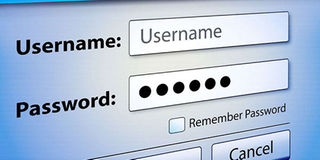Why retirement age for passwords is nigh

Passwords are progressively being phased out. PHOTO | FILE | NATION MEDIA GROUP
What you need to know:
- Bill Gates predicted the demise of passwords almost 15 years ago. He said passwords cannot meet the challenge of keeping critical information secure.
- Biometric systems use human features that are unique to individuals. These include fingerprints, palms, eye irises, finger veins and faces.
Passwords have passed their prime time. Their best days are behind us.
For the past three decades, they provided access to phones, personal computers, websites and many other platforms. But now, due to their worrisome weaknesses that predispose them to cybercriminals, they Passwords are progressively being phased out.
Cybercriminals use a variety of tricks and tools to attack and steal your passwords in hopes of breaking into your accounts and take away information of value.
Frustrated by the need to memorise many complex passwords – each made of a combination of letters, numbers and symbols – for their different accounts, many people use the same password across multiple devices and platforms.
This practice eases the work of cyber crooks because if they break one account, they have a free pass to all the others.
Over the years, there have been attempts to make them tough to crack. Such efforts have included crafting long and unique passwords and a two-step authentication system. Even with that, the poor password remains prone to attacks.
ALTERNATIVES
Due to these weaknesses, organisations are uneasy about using passwords as the key to their online resources.
A vast majority of information security professionals are also losing faith in the ability of passwords to protect digital resources. But if passwords aren’t reliable, what are the alternatives, and are they safer?
Many devices now come with the option of using biometric features for security. Biometric security trounces passwords on many fronts.
Biometric systems use human features that are unique to individuals. These include fingerprints, palms, eye irises, finger veins and faces.
Facial recognition could potentially be implemented on websites, which can scan your face through your PC, tablet or phone, providing a quick, easy and secure alternative to passwords.
Likewise, many devices come with the ability to read the texture of your finger and if it matches a previously recorded one, you get access to use the device.
Also, each person has a unique voice and some technologies have been designed to authenticate a user by their recorded voice. That is, your voice can be your new password.
SAFER OPTION
Use of voice as a password is common in households with devices like Amazon Echo and Google Assistant, and banks have started to allow customers to use voice-activated digital assistants to check their balances and transact a host of other services.
Bill Gates predicted the demise of passwords almost 15 years ago. He said passwords cannot meet the challenge of keeping critical information secure.
Our minds cannot even cope with the complex number of passwords for accessing numerous digital accounts.
Whereas hackers can steal passwords, they cannot steal your fingers, face or voice. A biometric security system is better. For that reason, passwords have run their course. They will soon be passé.
Mr Wambugu is an Informatician. E-mail: [email protected] @samwambugu2





